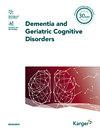Impact of Pre-Stroke Dementia or Mild Cognitive Impairment on Stroke Outcome: A Systematic Review and Meta-Analysis
IF 2.2
4区 医学
Q3 CLINICAL NEUROLOGY
引用次数: 1
Abstract
Background and Objective: Pre-stroke dementia (PSD) and pre-stroke mild cognitive impairment (PSMCI) are important risk factors for stroke. The present meta-analysis aimed to investigate the impact of PSD or PSMCI on stroke outcomes. Methods: Electronic databases (PubMed, EMbase, Google Scholar, Cochrane Library, and TRIP) were screened for eligible studies published prior to March 31, 2021. Risk ratios (RR) and mean differences with 95% confidence intervals (CIs) using random or fixed effect models were used to calculate pooled estimates. Study quality was assessed using the Newcastle Ottawa Scale. Results: Fifteen studies were included in our meta-analysis. Pooled data from ten studies involving 3,107 PSD and 20,645 non-PSD subjects showed a higher risk of mortality in PSD patients (RR = 2.03; 95% CI: 1.40–2.91; I2 = 89%). Risk of recurrent stroke risk was observed more in patients with PSD compared to non-PSD patients (RR = 2.02; 95% CI: 1.40–2.91; I2 = 0%). Three studies involving 300 mild cognitive impairment (MCI) and 1,025 normal cognition subjects showed a significant increased risk of mortality in stroke patients with MCI (RR = 2.43; 95% CI: 1.81–3.27; I2 = 20%). However, elevated stroke severity was not observed in PSMCI patients. Conclusions: Our meta-analysis shows an increased risk of mortality in stroke patients with a history of PSD and PSMCI. Proper clinical management and increased attention are therefore required for the prevention and management of stroke in patients with cognitive deficits.卒中前痴呆或轻度认知障碍对卒中预后的影响:系统综述和荟萃分析
背景与目的:脑卒中前痴呆(PSD)和脑卒中前轻度认知障碍(PSMCI)是脑卒中的重要危险因素。本荟萃分析旨在研究PSD或PSMCI对卒中结果的影响。方法:筛选电子数据库(PubMed、EMbase、Google Scholar、Cochrane Library和TRIP)中2021年3月31日之前发表的符合条件的研究。使用随机或固定效应模型的风险比(RR)和95%置信区间(CI)的平均差异用于计算汇总估计值。研究质量采用纽卡斯尔-渥太华量表进行评估。结果:我们的荟萃分析纳入了15项研究。来自涉及3107名PSD和20645名非PSD受试者的10项研究的汇总数据显示,PSD患者的死亡率较高(RR=2.03;95%CI:1.40-2.91;I2=89%)。与非PSD患者相比,PSD患者的复发性卒中风险更高(RR=2.02;95%CI:1.40-2.91;I2=0%)。三项涉及300名轻度认知障碍(MCI)和1025名正常认知受试者的研究显示,脑卒中MCI患者的死亡率显著增加(RR=2.43;95%CI:1.81-3.27;I2=20%)。然而,在PSMCI患者中没有观察到中风严重程度的升高。结论:我们的荟萃分析显示,有PSD和PSMCI病史的中风患者的死亡率增加。因此,需要适当的临床管理和更多的关注来预防和管理认知缺陷患者的中风。
本文章由计算机程序翻译,如有差异,请以英文原文为准。
求助全文
约1分钟内获得全文
求助全文
来源期刊
CiteScore
4.70
自引率
0.00%
发文量
46
审稿时长
2 months
期刊介绍:
As a unique forum devoted exclusively to the study of cognitive dysfunction, ''Dementia and Geriatric Cognitive Disorders'' concentrates on Alzheimer’s and Parkinson’s disease, Huntington’s chorea and other neurodegenerative diseases. The journal draws from diverse related research disciplines such as psychogeriatrics, neuropsychology, clinical neurology, morphology, physiology, genetic molecular biology, pathology, biochemistry, immunology, pharmacology and pharmaceutics. Strong emphasis is placed on the publication of research findings from animal studies which are complemented by clinical and therapeutic experience to give an overall appreciation of the field.

 求助内容:
求助内容: 应助结果提醒方式:
应助结果提醒方式:


